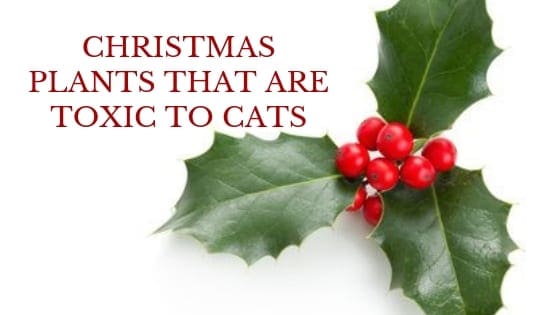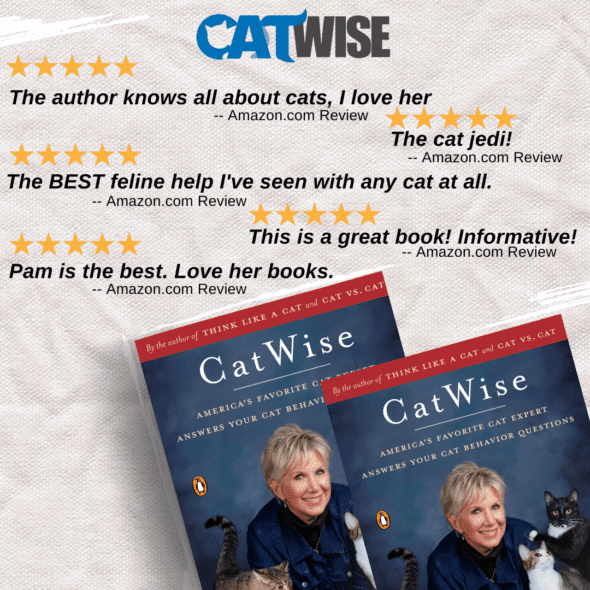
So many plants are toxic to cats and you may be very careful about keeping them out of your cat’s reach or even out of the house altogether, but the holidays can cause some of us to be a bit forgetful. Here’s a quick reminder about some common holiday plant dangers:
Christmas Tree
Aside from all the dangers of the ornaments, ornament hooks, lights and tinsel, there is a real danger to your cat from ingesting tree needles.
The water in the reservoir is also a danger for cats. Sap from the tree that settles in the reservoir is toxic, as are any tree preservatives used to extend the life of the cut tree. Some people put aspirin in the water to preserve the tree’s life and that’s highly toxic to cats and can be fatal. Cover the water reservoir with netting so you can still water the tree but the cat can’t gain access to the liquid.
Even if you have an artificial tree you’re not out of the woods in terms of toxicity if your cat likes to munch on the tree limbs. Ingestion of the artificial needles can cause stomach problems and can lead to intestinal blockage.
Spray tree limbs with a bitter anti-chew product made for plants. Wear a disposable mask when spraying the tree so you don’t breathe in the very unpleasant spray.
Poinsettia
Once believed to be deadly for cats, it’s now known that the poinsettia is mildly toxic. Ingestion can cause irritation to the mouth, esophagus and stomach. Spray the plant with a bitter anti-chew spray if your cat shows an interest in your holiday poinsettia plants. If the plant has been treated with pesticides then the toxicity level increases.
Holly and Mistletoe
Both are extremely toxic. Mistletoe can cause extreme intestinal problems and can even cause a severe drop in blood pressure. Both plants can cause breathing problems and intense abdominal pain. Seizures and even death may occur if a large amount of the plant is ingested. Make sure all holly plants are kept out of the cat’s reach. Be mindful of holly berries that may fall from the plant as they are just as toxic. Holly is a favorite centerpiece in many homes during the holidays but if you have pets, it isn’t worth the risk.
Lillies
It’s popular to give these bulbs as gifts but they’re highly poisonous. There are many different species of lily plants, such as: Easter, calla lily, tiger, peace and many more. All parts of the lily plant as poisonous. Some species of lillies, such as Easter lillies, tiger lillies, and day lillies are more deadly than others but to be safest, it’s best to ensure your cat has no access to any lily plant.
Amaryllis
This beautiful plant is highly toxic and ingestion can cause diarrhea, vomiting, drooling and decreased abdominal pain. In more severe cases, tremors and convulsions can occur. The bulb of the Amaryllis plant is even more toxic than the leaves.
Christmas Cactus
Although not really toxic, ingestion of the plant can cause mild stomach irritation and vomiting.
Be Safe
You may think you’ve put a plant out of reach but a determined or curious cat can climb or jump higher than you expect. Be on the safe side when it comes to decorating.
Need More Information?
For a list of toxic and non-toxic plants, visit the ASPCA website.
If you suspect your cat has ingested a toxic plant, contact your veterinarian or veterinary emergency clinic immediately. Minutes matter when it comes to potential poisoning.
The ASPCA also has a National Animal Poison Control Center that can be reached at
(888) 426-4435 (a consultation fee may be applied to your credit card)
For more information on cat behavior and training, refer to the best-selling books by Pam Johnson-Bennett. Pam’s books are available at bookstores and online. We’ve included links to Amazon on our website.
If you have a question about your cat’s behavior or health, contact your veterinarian. This article is not intended as a medical diagnosis nor is it a replacement for your cat’s regular veterinary care. This article is for general information purposes only.
 Problem Solving & Advice by Pam Johnson-Bennett Cat Behavior Expert & Best-selling Author
Problem Solving & Advice by Pam Johnson-Bennett Cat Behavior Expert & Best-selling Author


